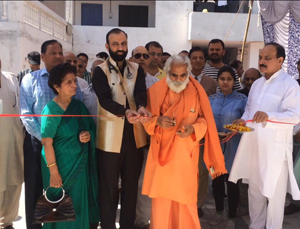
Excelsior Correspondent
JAMMU, Mar 26: Putting accent on one of the important principles of Arya Samaj that one should work for the eradication of non-knowledge (Avidya) and spread of knowledge (Vidya) as an important means in sensitising common populace about the various causation and effects of cardiovascular diseases, Dr. Sushil Sharma HoD Cardiology, GMC Jammu today conducted a day long camp in the precincts of Arya Samaj Kotli Colony, Rehari on the completion of 142nd years of the Arya Samaj.
The camp was inaugurated by Swami Madhavanand Ji from Hissar along with Dr Sushil Sharma. More than 250 patients were screened, evaluated and advised for prevention of cardiovascular diseases during the camp.
While interacting with the people, Dr Sushil stressed that there is a well known, large and persistent association between education and health.
“This has been observed in many countries and time periods, and for a wide variety of health measures. The differences between the more and the less educated are significant. For a better understanding of the forces shaping lifestyle, conditioning health habits, influencing the diffusion of health knowledge, attitudes and practices and providing support or pressure for the adoption of healthy and unhealthy behaviour, education is the powerful tool. It is a matter of common knowledge that the educated people are more keen towards the prescriptions advised by the doctors. They are even more careful in handling precautions and advisories suggested by the medical experts,” he added.
He, however, added that inspite of terming education as an important gradient in promoting good health some minor deviations in health indices are in part the result of differences in behaviour also across different education groups.
In terms of the relation between education and various health risk factors – smoking, drinking, diet/exercise, use of illegal drugs, use of preventive medical care, and care for hypertension and diabetes – overall the results suggest very strong gradients where the better educated have healthier behaviours along virtually every margin, although some of these behaviours may also reflect differential access to care. Those with more years of schooling are less likely to smoke, to drink heavily, to be overweight or obese, or to use illegal drugs. To be specific, education sensitises the common populace about the drawbacks of these vices, Dr Sharma said.
Others who were instrumental in this human endeavour included Dr. Dhaneshwar Kapoor, Dr Chakshu Mahajan and Dr Rajkumari. Volunteers comprising Vikas Kumar, Divya Sharma, Kamal Kishore, Kashmiri Lal ,Raghav Rajput ,Vikas Sabharwal, Ankush Kohli, Aman Gupta, Gorav Sharma , Nitan Sharma , Ajit Verma and Suresh Sharma were also present.

